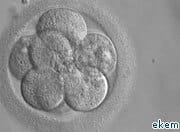The creation of genetically modified three parent babies has been backed by the Government, amid warnings from genetics experts.
The controversial technique, which uses IVF to take genetic material from three or four adults and create an embryo, is currently illegal.
If the technique is legalised, leading scientists and ethicists have warned that it could cause medical risks for future generations, and have raised concerns about the potential for it to dehumanise relationships between children and parents.
Supporters
But supporters of the technique say it will help avoid mitochondrial disease, which is passed on from mother to child.
Parliament will vote on final regulations for the technique next year.
If it is approved, the UK would be the first country to allow the creation of three parent embryos and the first patients could be assessed for treatment in 2015.
Public
The Human Fertilisation and Embryology Authority (HFEA) advised the Government to legalise the technique after it asked for the public’s views.
But Dr David King, director of campaign group Human Genetics Alert, said the consultation was flawed.
He said: “It is a disaster that the decision to cross the line that will eventually lead to a eugenic designer baby market should be taken on the basis of an utterly biased and inadequate consultation.”
Concern
And Josephine Quintavalle, of Comment on Reproductive Ethics, said the technique is already causing concern.
She said: “This controversial announcement – presented simply as innovative genetic treatment when it is in effect an endorsement of highly contentious germ line modification of the human embryo – is hardly unexpected, given the enthusiasm already shown by both the Nuffield Council (on Bioethics) and the HFEA.”
She added that the focus should now be on Parliament where the proposals could be voted down.
Modification
A main concern raised in the fertility watchdog’s consultation was of a “slippery slope” which could lead to further forms of genetic modification.
Professor Lord Robert Winston has previously warned that rapid advances in genetic technologies could lead to a form of child “eugenics” and have serious implications for society.
The technique involves replacing defective DNA in the mother’s egg with material from a donor egg – the resulting child would then genetically have two mothers and a father.

